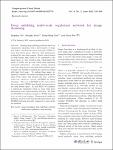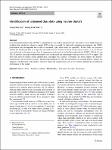Search
Author
- Amir, Ahangi (1)
- Dong-Ming, Yan (1)
- Heung-Seok, Chae (1)
- Jingzhao, Xu (1)
- next >
Subject
- DUMRN (1)
- Traffic Sign Recogniti... (1)
Date issued
- 2023 (3)
Has File(s)
- true (3)
Search Results
Existing deep unfolding methods unroll an optimization algorithm with a fixed number of steps, and utilize convolutional neural networks (CNNs) to learn data-driven priors. However, their performance is limited for two main reasons. Firstly, priors learned in deep feature space need to be converted to the image space at each iteration step, which limits the depth of CNNs and prevents CNNs from exploiting contextual information. Secondly, existing methods only learn deep priors at the single full-resolution scale, so ignore the benefits of multi-scale context in dealing with high level noise. To address these issues, we explicitly consider the image denoising process in the deep feature space and propose the deep unfolding multi-scale regularizer network (DUMRN) for image denoising |
Convolutional neural networks (CNNs), a representative type of deep neural networks, are used in various fields. There are problems that should be solved to operate CNN in the real-world. In real-world operating environments, the CNN’s performance may be degraded due to data of untrained types, which limits its operability. In this study, we propose a method for identifying data of a type that the model has not trained on based on the neuron cluster, a set of neurons activated based on the type of input data. In experiments performed on the ResNet model with the MNIST, CIFAR-10, and STL-10 datasets, the proposed method identifies data of untrained and trained types with an accuracy of 85% or higher. The more data used for neuron cluster identification, the higher the accuracy; conve... |
The correct and robust recognition of traffic signs is indispensable to self-driving vehicles and driver-assistant systems. In this work, we propose and evaluate two network architectures for multi-expert decision systems that we test on a challenging Traffic Sign Recognition Benchmark dataset. The decision systems implement individual experts in the form of deep convolutional neural networks (CNNs). A gating network CNN acts as final decision unit and learns which individual expert CNNs are likely to contribute to an overall meaningful classification of a traffic sign. The gating network then selects the outputs of those individual expert CNNs to be fused to form the final decision. |



